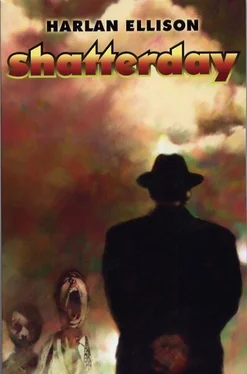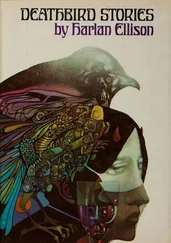But when I refused to go further, Jerry Olander’s voice played Pied Piper to the living dead in the quicklime pit of memory, and another shambling, rotted thing dragged itself up onto the landscape of my mind, and I saw myself as a child, coming home from a ghastly month at some nameless summer camp. And, of course, the name was right there, unremembered for thirty years, just as fresh as if I had come home yesterday. Camp Bellefaire. On Lake Belle. I had hated it, had pleaded with my mother and father every Sunday when they had come to visit me—like seeing a Death Row resident during visitation hours—”Please take me home, Momma, Poppa, please. I don’t like it here!” But they had never understood that there are some children for whom organized activities in which they can never distinguish themselves is a special sort of debasement.
And I had come home gladly, to see Charlie, my dog; to move around freely in my room with the Erector set and the comic books and my very own radio; to build Stukas and Lightnings and Grumman seaplanes, and smell TesTor’s cement once again.
And Charlie was dead. “Do you remember that summer, Mrs. Corley?” I heard myself saying, and Jerry Olander wasn’t making me say it. “Do you remember how you told the man at the pound that the dog was running loose for a week? Do you remember how you found Charlie’s tags caught on your bush in the backyard, and didn’t turn them in? I remember, Mrs. Corley, because you told Mrs. Abrams next door, and she told my Momma, and I overheard my Momma telling my Poppa. You knew who Charlie belonged to, Mrs. Corley; he’d lived here for ten years, so you had to know.”
And then I pushed Mrs. Corley to her knees, and turned on all four jets of the gas range, and opened the oven and put her head inside while she struggled, and hit her once sharply behind the left ear, and laid her head down on the open door of the oven, left her kneeling there in prayer, final prayer, ultimate prayer… and went away.
“I liked the part about the dog tags best,” Jerry Olander said, on the plane back to California.
In the fourth year of the war with that evil intelligence in my brain, I was ordered to kill, and did kill, seven people, including my Uncle Carl and old Mrs. Corley. And each one made me sick to think about it. I had no idea if Jerry Olander was merely the product of my own mind, a sick and twisted, deranged and malevolent phantom of a personality that had finally split, or if he was a disembodied spirit, an astral projection, a dybbuk or poltergeist or alien from the center of the Earth that had come to wreak murder on the race of humans, using me as his unwitting tool. I have seen enough motion pictures, read enough mystery stories, seen enough television programs in which a man’s evil nature takes him over, to know that is the most rational answer.
There is no reason to believe me, but I swear, Jerry Olander never came from within me. He was from outside, a rejected thing. And he inhabited me without my consent. It had been war, and he had won battle after battle, and I knew if those killings were ever traced to me I would spend the rest of my life in a home for the criminally insane… but further than saying, as quietly and as miserably as I can… I was not Jerry Olander… what can I say to convince…
And finally, it came the time I had known would arrive, from the moment he ordered the death of my Uncle Carl.
Jerry Olander said to me, as the fourth year of the war drew to an end, “Now it’s time to kill Nancy.”
“No!” I screamed. “No. I won’t do it. I’ll kill myself first. You can’t make me, there’s no way you can make me, I’ll fight you, you’re not going to make me do that!”
Nancy was my ex-wife. She had left me, but there wasn’t the faintest vestige of bad feeling in me about it. She had made her reasons for wanting a divorce plain to me, and they were good and sound reasons. We had been married when we were too young to know better, and through the years we had loved each other. But Nancy had learned she was more than a wife, that she had never been provided the opportunity to know herself, to expand herself, to fulfill the dreams she had had. And we had parted with love.
Now she lived in Pasadena, working with an orthopedic shoe company that had designed a special footgear for those who suffered with Hansen’s Disease. Her life was full, she was responsible and settled, mature and wonderful. We talked from time to time, occasionally had dinner together.
I meant her no harm.
“There’s no sense to this!” I said, pleading with Jerry Olander. “There’s no sense to any of this. Please let me alone, let me kill myself if that’ll give you some satisfaction! But don’t try to make me do this!”
“It all makes sense,” he said, getting nastily quiet. “Everything you do is colored by those memories. How many nights have you lain awake in pain from a toothache, rather than going to a dentist because the family sent you to Cousin Franklyn to save a few dollars on dental bills? How many of your teeth that might have been saved did he pull because he was no damned good, should have been a butcher instead of a dentist? You’re afraid of dentists to this day because of Cousin Franklyn. And how many women who might have loved you have you walked away from, picked fights with, ignored, considered better or worse than you, not your ‘type,’ because of Peggy Mantle and the way she laughed at you when you were fifteen? How many times have you walked past a store where you needed to buy something, because you remembered the way old man Clareborne threw you out of his department store when you were a little boy? How much of what you think is free will is just a programmed reaction to things you’ve buried, memories you don’t want to remember, pains and slights and affronts you suffered as a child? How many, chum? How goddam many? Oh, there’s sense here!”
Jerry Olander had me walk across the room. To the telephone.
“But I’m all alone now. I have no one. No wife, no children, no mother, no father, not even too many people I can call friends. I’m all alone; won’t you leave me Nancy!”
I began to dial a number.
The phone began to ring.
“You’re not alone, chum,” Jerry Olander said softly. “I’m right here with you. And I’ve got a long, long memory.”
The receiver was picked up at the other end and a voice said, “Hello.”
Zombie things from the quicklime pit began emerging, one after another of them; dozens of them, summoned by Jerry Olander’s long, long memory. I wanted to shout, to make a terrible dying sound, to clarion a warning, and found I could not even do that. In the fourth year of our war, Jerry Olander had even gained control of my words, and I had lost, I had lost, I had lost!
“Hi, Nancy,” I heard myself saying, “what are you doing for dinner tonight?”
Life is too short to occupy oneself with the slaying of the slain more than once.
THOMAS HENRY HUXLEY, c. 1861
Alive and Well and on a Friendless Voyage
Introduction
In recent years—and you’ve probably heard me bitching about this elsewhere—writers of contemporary fantasy have come in for considerable attention from Academe. I’ve been spared more of that kind of literary disembowelment than, say, Bradbury or Heinlein or Le Guin, mostly because I tend to move too fast and too shiftily for any publish-or-perish professor to get a handle on me. (There are those who contend I’m unworthy of serious attention, and to them a tip of the hat. I have this paranoid belief that the more acceptable one becomes to the Establishment, the less dangerous and troublesome is one’s work.)
Notwithstanding these baseless canards, there have been essays and monographs and even treatises published in learned journals about the rampant symbolism in my stories, my preoccupation with the Machine As God, the deeply religious anti-religiousness in Deathbird Stories, obvious uses of the Jungian archetypes, the crucifixion and resurrection symbology peppered through my stories, and the frequency of the use of the word “ka-ka.”
Читать дальше












